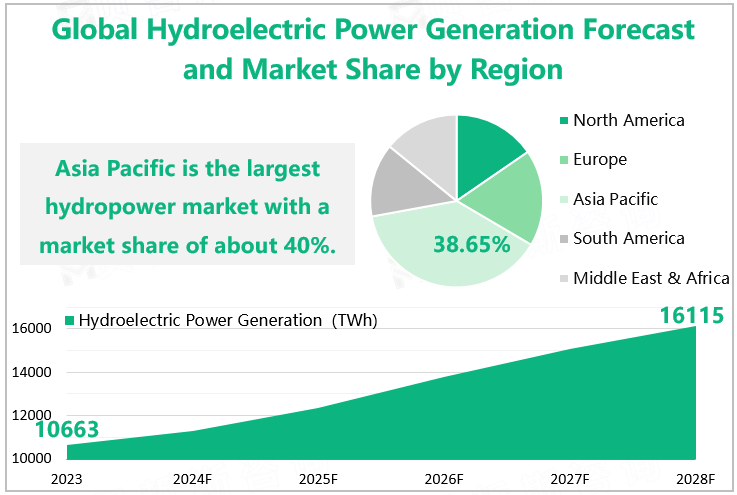Hydropower refers to the process of converting the
potential or kinetic energy of water flow into mechanical energy, and further
converting mechanical energy into electrical energy. Hydro-energy is a clean
and renewable energy source, which is of great significance for reducing
environmental pollution and protecting the ecological environment. With the
increasing severity of global climate change and environmental issues, the
demand for clean energy such as hydro-energy is constantly growing. As an
environmentally friendly power generation method, hydropower has enormous
development potential in its market.
Introduction to Subdivision Types
|
Classified by concentrated drop
|
-
Dam type:Build dams on the river, concentrate the drop,
and then use the water from the reservoir to generate electricity. This type
of power generation method typically involves large-scale hydropower stations
with high water volume and head.
-
Diversion type:Water is diverted from the upstream or side of
the river, with a concentrated drop for power generation. This type of
hydropower station has a relatively small scale, but it can also fully
utilize water resources.
-
Hybrid:Both dam and water diversion methods are used to
generate electricity with concentrated drop. This approach can fully utilize
terrain and water resources to improve power generation efficiency.
-
Tidal type:using the potential energy generated by tidal
fluctuations to generate electricity. This method is mainly distributed in
coastal areas, where tidal energy resources are abundant.
-
Wave type:Utilizing wave energy to convert into mechanical
energy and then into electrical energy. This method is mainly applicable to
areas with abundant marine resources.
|
Source: www.globalmarketmonitor.com
Overview of Global Market Development
Hydropower helps to ensure national energy security and reduce dependence on external energy. Meanwhile, hydropower projects typically have a longer operational lifespan and can provide a stable power supply to the country. Against the backdrop of global energy transformation and low carbon, hydropower continues to be favored worldwide due to its advantages of cleanliness, renewability, and low operating costs.
In recent years, the global hydroelectric power generation has continued to grow. According to our research data, the global hydroelectric power generation reached 10663 TWh in 2023. In the future, with the continuous progress of hydropower technology, the performance of key equipment such as water turbines, generators, and intelligent monitoring will be continuously optimized, and the efficiency and stability of hydropower will also be continuously improved, which will drive further market development. At the same time, the support of government environmental policies will also inject new impetus into market development. It is expected that global hydroelectric power generation will increase to 16115 TWh by 2028. However, the market will also face some technical challenges, such as the design and manufacturing of large water turbines, and the stability of intelligent monitoring systems.
Analysis of Market Development in Major Regions
From a regional perspective, the Asia Pacific region is the world's largest hydropower market. According to the data, the hydroelectric power generation in the Asia Pacific region reached 4121TWh in 2023, accounting for 38.65% of the global market. The European and North American markets have become the world's second and third-largest hydropower markets with 18.06% and 15.41% respectively.
Global Hydroelectric Power Generation Forecast and Market Share by Region
Source: www.globalmarketmonitor.com
For more industry information, please refer to our latest released "2023 Global Hydropower Market Analysis Report, Key Competitors, Market Effect Factors, Growth, And Forecast".
